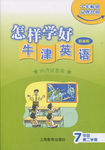题目内容
The new survey shows that the number of students ______ computer games has been increasing in recent years.
A.devoted to B.related to
C.connected to D.addicted to
D
【解析】
试题分析:考查动词短语辨析。A devoted to专心于…,献身于。.B relate to 有关,涉及 C connected to 与…连接。D沉迷于...。其中选项A与D中的to为介词,后面接名词或动名词,选项B与C中的to是动词不定式,后面接动词原形。句意:这项新的调查显示近些年沉迷于网络游戏的学生人数增多。故选D 。
考点:考查动词短语辨析

 怎样学好牛津英语系列答案
怎样学好牛津英语系列答案 导学教程高中新课标系列答案
导学教程高中新课标系列答案Most people who travel from China to the US find that, despite having studied English for years, they have to “re-learn” it upon arriving.
Words that we learned in English classes are not pronounced the same way here. To truly be part of the “melting pot”, fluency in English is not enough. You need an accent to stand out.
When I first came to the US for graduate school, I was a nervous foreigner. I felt so out of place that I wanted to hide everything about me that was “different”. To talk like an American became one of my goals.
During my first term as a teaching assistant (TA), my students complained they could not understand me. I learned later from a study that this complaint was common among US students with an international TA.It is called the “Oh, no!” syndrome (情绪、举动): “Oh,no! Not another international TA, and not that accent again!’’
So I imitated(模仿)the way native speakers talk and, over time, I made such good progress that American friends started to praise my English as having “almost no accent’’. I took this as a sign of my success. Ever since, people have often mistaken me for someone from many places: the Midwest, the West Coast, China, Japan, South Korea. Most frequently, people think I am from California.
Suddenly, conformity ( 一致) was no longer a praise: If I talk like an American , am I still Chinese? If I lose my Chinese accent, do I also lose my cultural identity? Am I denying my past by being absorbed into a new culture?
Now I realize that a person’s accent is a permanent record of their past cultural experience and it is amark of one’s experience and exposure to different cultures.
As a fourth-year student in the US,I am no longer a nervous foreigner. My nervousness has been replaced by a desire to hold on to my cultural origins. Now I consciously add some Chinese“accent” when I speak.I do not wish to speak “perfect” English because I am proud of who I am.
1.Why does the author think people have to “re-learn” English upon arriving? ( No more than 10 words).
2.How did the author feel when others praised her English? (No more than 5 words)
3.Why did the author decide to speak with a bit of a Chinese “accent”? (No more than 10 words)
4.Please explain the underlined part in English in another way. (No more than 8 words)
5.What is the article mainly about? (No more than 8 words)
On a very cold evening, an old man was trembling with his nearly icy hair and beard beside a river. Anxiously, he was waiting for a across the river. The wait seemed . The old man sat on the ground waiting for quite a long time.
, he saw several horsemen coming. He watched them silently and let the first one pass by without even asking. Another passed by, and then another, till the last rider came near the old man.The old man caught the rider’s and said, “Sir, would you giving me a ride to the other side?”
his horse,the rider replied,“Of course not.”But it was so cold that the old man’s body was almost . He could not get the ground.The horseman helped the old man onto his horse.He took the old man not just across the river, to the old man’s home.
As they the old man’s house, the horseman asked,“Sir, you let several other riders pass by without even asking. Then I and you asked me for a ride at once. Why? I had said ‘no’ and left you there?”
The old man stared at the rider straight in the eyes, and said, “I looked the eyes of the other riders. I quickly saw that they didn’t .It would be even asking them for a ride.But in your eyes,I saw . I knew that you would help me.”
The words the rider deeply.“Thank you for what you’ve said,”he told the man.“I hope I will never leave others 28 because I’m too busy, and every citizen does in my heart.”
With that, Thomas Jefferson,the third president of the US, turned his horse around and made his back to the White House.
1.A. trip B. ride C. help D. drive
2.A. cruel B. boring C. unfortunate D. endless
3.A. Gradually B. Finally C. Sadly D. Surprisingly
4.A. eye B. hand C. back D. face
5.A. like B. think C. please D. mind
6.A. Riding B. Speeding C. Stopping D. Leaving
7.A. stuck B. Shocked C. frozen D. injured
8.A. on B. down C. in D. off
9.A. and B. but C. so D. then
10.A. neared B. visited C. arrived D. left
11.A. came in B. came on C. came up D. came out
12.A. Even if B. What if C. As if D. Only if
13.A. out B. for C. into D. up
14.A. wait B. try C. ask D. care
15.A. Useless B. risky C. dangerous D. foolish
16.A. loyalty B. generosity C. ambition D. kindness
17.A. attracted B. comforted C. touched D. pleased
18.A. alone B. out C. away D. behind
19.A. live B. believe C. count D. help
20.A. living B. choice C. mind D. way